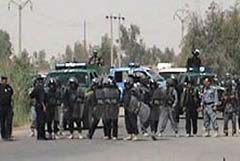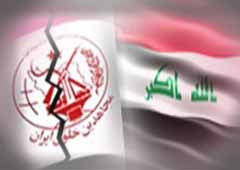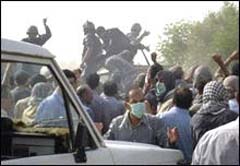Iraqis urged to keep camp
The United States is quietly pressing Iraq not to close a camp that holds more than 3,000 members of an Iranian opposition group that served as Saddam Hussein’s shock troops in 1991 when he crushed rebellions after the Gulf War and now is vulnerable to Iraqi and Iranian reprisals.
members of an Iranian opposition group that served as Saddam Hussein’s shock troops in 1991 when he crushed rebellions after the Gulf War and now is vulnerable to Iraqi and Iranian reprisals.
Last week, Iraqi police stormed Camp Ashraf outside Baghdad, killing at least seven and injuring dozens during clashes with the Mujahedeen-e Khalq, or MEK. At the time, members of a U.S. unit known as Task Force 134, which deals with prisoners of war, were present outside the compound, said two U.S. officials — one in Washington, one in Iraq — who asked not to be named because of the sensitivity of the issue.
A day after the raid, officials at the U.S. Embassy in Baghdad met with members of the Iraqi government to urge restraint. The next day, the U.S. Army helped medevac at least two dozen injured members of the MEK, the officials said.
Many Iranians despise the group for siding with Iraq during the 1980-88 Iran-Iraq war. Iraqi Shi’ites have grievances that grow out of the MEK’s participation in crushing an uprising in southern Iraq after the 1991 Gulf War.
The U.S. has designated the MEK as a terrorist group for these actions and for the assassinations of six Americans in Iran before the 1979 Iranian revolution. But the U.S. nevertheless has sought to protect Camp Ashraf members — who include women and children — from Iraqi or Iranian attack and forced repatriation.
The camp had been under U.S. protection since the 2003 invasion of Iraq. Iraq now seeks to reassert control under the provisions of the Status of Forces Agreement signed with Washington last year.
Iraqi media have reported that the government plans to close Camp Ashraf and disperse its residents to other locations in Iraq. Such a move could make the dissidents more vulnerable to Iranian intelligence and angry Iraqi Shi’ites who lost family members in 1991.
"Embassy officials met with representatives from the Government of Iraq [GOI] on July 29, to stress the importance of the GOI fulfilling its commitment to the United States Government to treat Ashraf’s residents humanely and to propose permitting an assessment of injuries and deaths by U.S. forces," one U.S. official wrote in an e-mail to The Washington Times. "The GOI allowed a U.S. medical assessment team to enter Ashraf and subsequently approved joint U.S.-Iraqi medical assistance to injured MEK Ashraf residents."
A spokesman for the Iraqi government, Ali al-Dabbagh, acknowledged that there had been meetings with Americans about the subject.
"There will be no plans to move [the MEK members] anywhere in the short term," he said, denying the Iraqi media reports. "We are thinking of their security about finding a safer place. But till now, this plan is not yet approved."
By Eli Lake


